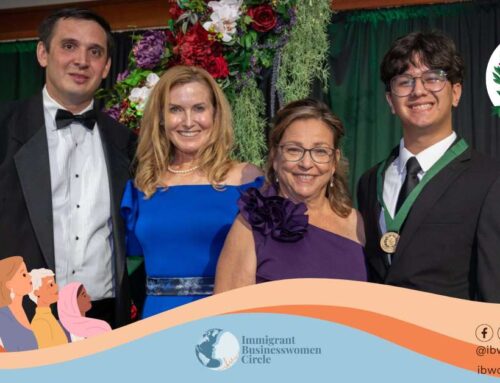Part of the Diversity, Equity, and Inclusion blog post series
America is world-renowned for its entrepreneurial business spirit, and this spirit is fueled in large part by immigrants. Contrary to popular belief, many successful entrepreneurs are refugees with a lower level of education, first-generation immigrants or their children, and–albeit often left out of the conversation–women.
A New American Economy report shows that in 2015 the United States was home to more than 180,000 refugee entrepreneurs and that 13 percent of refugees were entrepreneurs compared to just 11.5 percent of non-refugee immigrants and 9.0 percent of the U.S.-born population. In sum, the common characteristics among all immigrants are their courage to leave their home countries and their drive and determination to start a new life in the United States.
According to the Small Business Administration, immigrants have higher business ownership and formation rates than U.S.-born entrepreneurs. Roughly one out of ten immigrant workers own a business and thousands more start a business each month. A new study shows that, relative to their population, immigrant-founded businesses create 42% more jobs in America than ones started by U.S.-born entrepreneurs. Moreover, in the United States, where 13.7% of the population is foreign-born, immigrants represent 20.2% of the self-employed workforce and 25% of startup founders. Further, according to a 2018 study by the National Foundation for American Policy, immigrants founded or co-founded 55% of the United States’ billion-dollar companies — so-called unicorns. In addition, the 2020 New American Fortune 500 report found that 44 percent of Fortune 500 companies were founded by immigrants or their children.
The immigrant story of leaving one’s home country behind and starting a business in the U.S., while familiar, is still often associated with men. In reality, a considerable proportion of immigrant entrepreneurs are women. The 2021 Annual Report from the National Women’s Business Council, shows that 1.5 million women business owners are not U.S. citizens, representing 11.5% of all women business owners and 38.6% of all immigrant business owners.
Resilience is the important factor that immigrant women and entrepreneurs have in common. After all, starting a company is a lot like moving to America—you have to adapt to survive. A report from the New American Economy shows that in 2017, there were 1.2 million immigrant women entrepreneurs in the United States. More than 65,000 immigrant women ran their own restaurants and food service businesses, more than 55,000 owned beauty salons, and another 50,000 had their own nail salons.
The United States still represents the land of opportunity to immigrant women, according to the 2019 Mastercard Index of Women Entrepreneurs. This index uses three components to rank the best country for female entrepreneurship among 58 nations (women’s advancement outcomes, knowledge assets & financial access, and supporting entrepreneurial conditions). For the first time, the United States ranked first due to its significant increase in the rate of women business owners compared to 2018.
Another remarkable trend in women entrepreneurship shown in the 2018 State of Women Business Report seen over the past eleven years has been the phenomenal growth in the number of firms started by women of color. While the number of women-owned businesses grew 58% from 2007 to 2018, firms owned by women of color grew at nearly three times that rate (163%). Numbers for Latinas and African Americans grew even faster: 172% and 164% respectively. The report further indicates significant growth for Native Hawaiians/Pacific Islanders (146%), Asian Americans (105%), and Native Americans/Alaskans (76%).
In 2005, the American Immigration Council published a report showing that the largest group of immigrant women entrepreneurs in the United States (234,454 or 41.6 percent of the total) comes from countries in Latin America and the Caribbean. In Latin America, Mexico is by far the largest sender at 93,122, accounting for 39.7 percent of immigrant women entrepreneurs from the region and 16.5 percent of all immigrant women entrepreneurs in the country. The other major sending countries in the region include El Salvador (21,039), Cuba (16,563), Colombia (13,185), and Brazil (11,008). The second largest group – 165,483 or 29.4 percent of the total – comes from Asia and the Pacific Islands, with the largest numbers hailing from Korea (34,437), Vietnam (27,721), Philippines (22,742), China (16,313), and India (16,187).
Immigrant women entrepreneurs from all over the world have fueled the American economy throughout the years, not only with their willingness to take risks, but also through their resilience, demonstrated by their continuous ability to triumph over adversity and become a rising power in the U.S. economy, benefiting all of American society.
Source: Think Immigration














